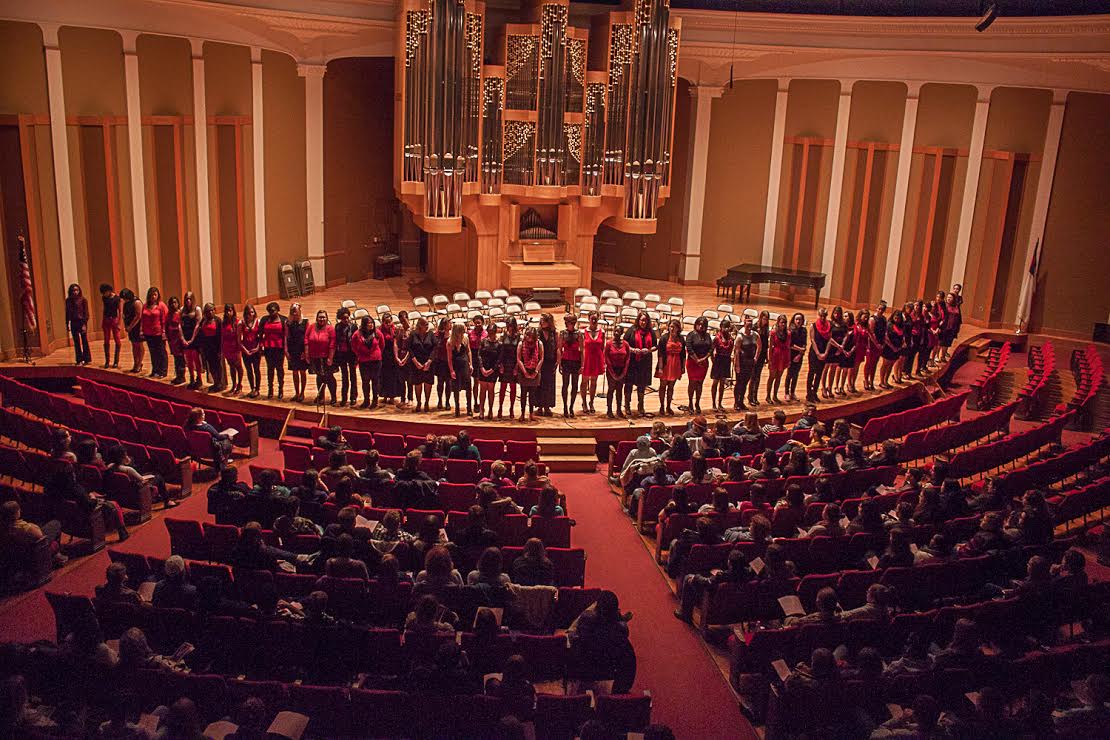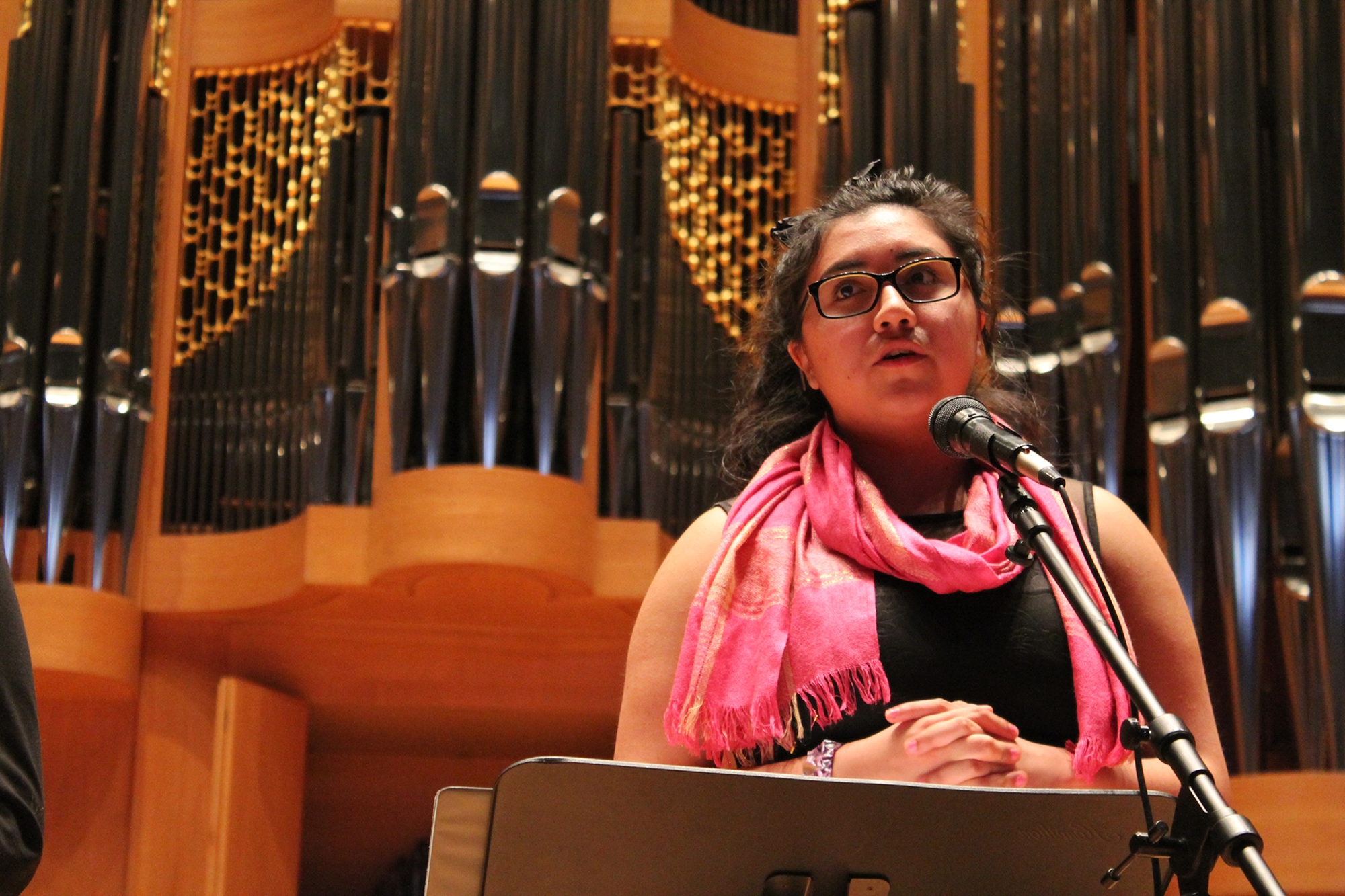‘The Vagina Monologues,’ a re-occuring movement

By Megan Dill
Transcript Reporter
Last Saturday, students of Ohio Wesleyan preformed “The Vagina Monologues” to give voice to women’s stories and struggles.
“I hope that women find a sense of empowerment and that all genders find that they were educated about sexuality and women’s experience,” said senior Claire Hackett, producer and co-director of the production.
For the third consecutive year at OWU, students gathered to perform the set of monologues based on women’s various experiences with sex, rape, orgasm, birth and more.
Before the monologues began, Pitch Black, OWU’s female a capella group, preformed renditions of Macklemore’s “Can’t Hold Us,” Gloria Gaynor’s “I Will Survive,” and a mash-up “Tonight I’ll be Your Sweet Dream.”
Sophomore Pitch Black member, Emma Sparks, said their performance was incorporated into the show to promote female empowerment through music.
“Although women a capella groups that sing non-traditional music are increasing, they are still a newer phenomenon and are not as common as male groups,” Sparks said.
“It was another way to show that women not only have the ability, but have the passion and drive to do anything.”
After Pitch Black’s performance, the monologue performers took the stage and recited 14 short pieces.
The stories mostly focus on a realization or change in how a person feels about their vagina according to Hackett.
“In ‘The Little Coochie Snorcher That Could’ a young woman experiences a lot of trauma to her vagina, including rape when she was 10, but is changed by an enlightening sexual experience with an older woman,” Hackett said.
“But in ‘My Vagina Was My Village,’ a woman tells of how beautiful and wonderful her vagina used to be, and what is like after genital mutilation.”
For sophomore performer Elizabeth Raphael, reciting a monologue meant being able to feel comfortable with talking about vaginas and sexuality.
“I think the overall message of the show is that women from all over the world has every right to be proud of their vaginas, and any act that makes women think otherwise needs to be stopped,” Raphael said.
Yasmin Radzi, a sophomore performer, said being a part of the production helped her to gain closure from a negative sexual experience in her past.
“Being in ‘Vagina Monologues’ has really helped me grow, has helped me to find closure, and has helped me to gain strength,” she said.
‘Butterfly Confessions,’ a new tradition of diversity

By Jija Dutt
Transcript Reporter
Thirty-seven women of color, ten different monologues and a packed audience. History was made last Friday as Ohio Wesleyan became the first college to perform Yetta Young’s “Butterfly Confessions.”
“Butterfly Confessions” is “a love letter to women of color that reveals heartfelt emotions about intimacy, sexual responsibility and overcoming adversity,” according to the Facebook page for the event.
Though written for black women only, OWU’s production was modified to include a diverse group of women in order to properly represent the multinational student population on campus.
Junior Khristina Gardner was one of five directors for the play and said that it would not have been possible without the play’s producer, senior Claire Hackett.
“We are all women of color and for Claire to reach out to all of us to share the heartfelt stories within the monologues was so wonderful,” Gardner said.
“She was determined to take steps towards making a change on this campus and to bring light to various issues and she did just that.”
Gardner said she was very excited about the opportunity for the voices of black women to “finally be heard.”
Her goal for the play was to make the “women feel comfortable and form a connection with the monologues that they performed.”
Senior Madeline Miguel a part of the diverse cast said that her ethnicity is comprised of Japanese, Filipina and White.
“As someone who is of mixed ethnicity its difficult for me to feel like a fit in,” said Miguel.
“I chose to be a part of this production because I think it’s important for women of color to have a voice and a presence on our campus.”
Miguel said her only challenge was that she “felt a little strange and a bit left out” because the monologues were all written for black women.
“I couldn’t relate to black women, but I could relate to struggles of being a minority woman,” Miguel said.
“The directors were excellent at encouraging us that all of us were an important part of this production.”
Miguel added that she was particularly interested in the combination of light hearted, funny monologues and the more serious hard-hitting topics of HIV/AIDS and child abuse.
“It showed the audience a part of a culture with which we coexist, but rarely recognize or notice. It was amusing, sad and all too real,” said freshman Jessica Sanford of the performance.
From scheduling conflicts to the nervousness of being a first time director, Gardner said she was glad with the way the show turned out.
“I want to see ‘Butterfly Confessions’ grow,” she added. “I want to see the women who chose to be involved with ‘Butterfly Confessions’ grow. I want to see the Ohio Wesleyan community as a whole grow from this production as well.”
The first collegiate performance of ‘Confessions’ concluded with a standing ovation from the audience of Grey Chapel.